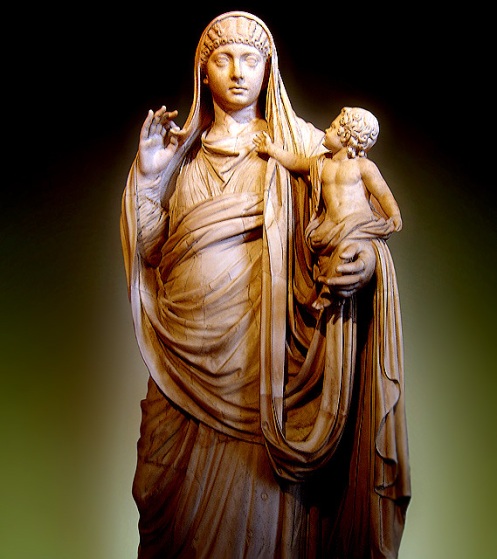Messalina was the daughter of Messala Barbatus, who was the grandson of Claudius Marcellus and Octavia, sister of Augustus. Her mother was Domitia Lepida, who was the granddaughter of the same Octavia and Mark Antony. She was, in fact, more closely related to Augustus (twice through Octavia) than Claudius (once through Octavia). She provided Claudius with two children, Octavia and Britannicus. She was the ideal consort. The tradition, however, depicts her as wildly promiscuous and consequently she has been the source of a host of pornographic fantasies.

Messalina (Louvre)
Fantasy is the problem with Messalina.
- How much can we believe?
- How much is fantasy?
From the first, Messalina is associated with bad things happening, such as the exile of Julia, who was accused of adultery with Seneca. But when Messalina is brought into the story, it becomes an act of feminine jealousy: Julia was beautiful, spent time alone with Claudius (her uncle), and didn’t show Messalina enough respect (Dio, 60.8)
In AD 42, Appius Junius Silanus was summarily executed. He was a leading figure in the new regime and had married Domitia Lepida, Messalina’s mother, at the request of Claudius, in AD 41. His fall was spectacular and, one imagines, a disaster for Claudius’ efforts to depict himself as a break from the violence of the reign of Gaius.
The story is ridiculous. Messalina and Narcissus both told Claudius that they had dreamt that Silanus was trying to kill him, and then arranged for Silanus to get involved in a scuffle entering the emperor’s apartments. Claudius executed him immediately and then thanked Narcissus publicly for his vigilance (Dio, 60. 14; Suetonius, Claudius 37). There can be little doubt that our sources meant us to read the accusations as ridiculous.
When the hand of Messalina is detected, the story becomes one of desire. She wanted to have sex with him, but he refused. She got annoyed and conspired to remove him. The possibilities of serious political divisions in the imperial family or of a powerful aristocrat getting annoyed or even of rumours of conspiracy sufficient to terrify Claudius disappear behind the compelling story of a woman’s lust for her mother’s husband.
Catonius Iustus, Praetorian Prefect (Dio, 60.18), was removed, possibly in AD 43. Command of the Praetorians was an especially important post under Claudius. In the last instance, his power relied on the Praetorians. No doubt over the loyalty of the Prefect could be allowed. His fall is not attributed to refusing Messalina’s advances, but to her fear that he might expose her adulteries.
Dio (60. 18) places an extended account of Messalina’s increasingly reckless sexual promiscuity in AD 43. This is probably not a coincidence. Claudius was preparing to leave Rome for his invasion of Britain. His trusted friend Lucius Vitellius was left in charge at Rome, but his absence created uncertainty and a need to delegate authority. We could understand the increasing prominence of Messalina as a political move on the part of Claudius to ensure that he had loyal support at home.
The power of Messalina outlasted Claudius’ absence. The stories of her infamies stretch credibility. M. Vinicius was also killed for refusing to sleep with the empress. He was the brother of the Vinicianus at the centre of the conspiracy of 42. He was supposedly poisoned, a ‘feminine’ method of striking at one’s enemies, but also easy to alleged and very difficult to disprove (Dio, 60. 27.4). Decimus Valerius Asiaticus was killed in 47. He was a respected senator of provincial origin and cannot easily be seen as a threat to Messalina or Claudius. The killing is explained as a convoluted sexual conspiracy and a plot to seize Asiaticus’ gardens in the centre of Rome, gardens in which Messalina was herself to be killed (Dio, 60.29.1–6; Tacitus, Annales 11. 1–3). Asiaticus was associated with another intended victim. Poppaea. Asiaticus went to his death calmly, making arrangements for the funeral, a martyr. This, and his Eastern origins, point to an opposition which was more ideological, emerging from a philosophical engagement.
In the same year, in a case which cannot be convincingly related to the death of Asiaticus, Pompeius was killed. The death of Pompeius would seem to have enhanced Messalina’s control. He was not tied to her part of the family and owed nothing to her.
Nevertheless, there are signs of her position slipping. The instrument of her attack on Asiaticus, a certain Suillius Rufus, was himself attacked in the senate, though the debate failed to bring him down (Tacitus, Annales 11. 4–7) and L. Domitius Ahenobarbus received more applause than Britannicus at the secular games of 47, which Tacitus interprets enigmatically as a gesture of sympathy for Agrippina.
Messalina’s Fall Claudius’ Women Politics